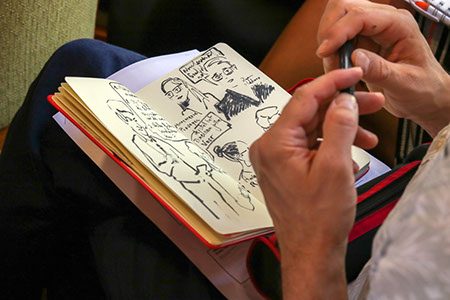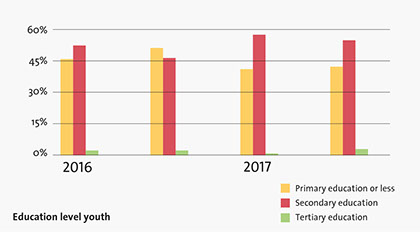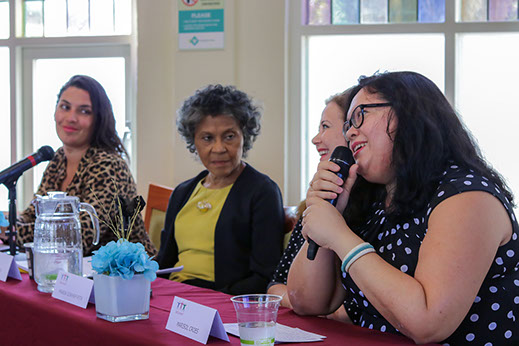WeConnect seminar:
Aruban labor market & education
September 2019

Young professionals and graduates are in need of perspective in order to pursue their career in Aruba. Idealism and the willingness to contribute to the island are not enough to draw back, or keep the best and the brightest in Aruba. Education leaders as well as policy makers are aware of that major challenge.
That is the conclusion of the first WeConnect Aruba seminar, titled ‘Bringing our graduates home; do locals have special value for the local labor market?’
Text Dilma Arends
WeConnect Aruba is a branch of Stichting WeConnect Nederland. The Aruba organization is presided by Dr. Paula Kibbelaar, with Rose-Marie Provence, MSc, and Patrick Brown, LLC, as board members.
The object of the foundation is to bring together education and youngster initiatives, from a joint Kingdom approach. There is currently an obvious vacuum in terms of awareness and information sessions, guidance and assistance of youngsters and students of Antillean and Aruban descent within the Kingdom and Surinam. The task of WeConnect Aruba is to align with partners like the University of Aruba to organize symposiums, panel discussions and conferences on the theme of education and labor market.
The first event took place in May in the Aula of the University of Aruba (UA), with a large participation of young professionals, students and leaders in the field of education and labor. The seminar was opened by UA rector Dr. Glenn Thodé who said to be proud of being a partner with WeConnect. ‘Let’s bring parties together to hold the dialogue on how to bring back our graduates or make sure we keep our graduates in Aruba’, he stated at the opening of the session.
Dr. Paula Kibbelaar illustrated that the mission of WeConnect Aruba is to initiate, facilitate and support all activities, projects and seminars that highlight the importance of a sustainable inclusive platform that will embrace all the experiences of inclusion, diversity, local awareness and emancipatory transformation processes. Education in all its forms strengthens our youth, the future generation.
’This means a profound understanding of the political, social and economic context and the current socio-economic developmental perspectives that determine the opportunities and challenges that our youth from all kinds of cultural and ethnic backgrounds face today’, she emphasized. ‘Our vision is to encourage future generations to be active and committed citizens and to develop as a engaged, responsible, knowledgeable, caring and inclusive citizens.’

Youth labor data
In Aruba almost one fifth of the labor force was unemployed. The unemployment rate increased in 2017 from 17,9% in 2016 to 19,4%. Compared to other islands in the Caribbean, the youth unemployment rate in Curaçao in 2017 was 32,8%, in Bonaire 20,2% while in Sint Maarten in 2017 the unemployment rate was 23,8%.
The participation rate for youth in Aruba has been around 35 to 40% in the last years. This means that on average 37% of our youth are in work or looking for a job. In 2017 the participation rate was 38,9% while around 31% of our youth were employed.

The education level of the youth has been almost the same in the years 2016 and 2017. About 45% of our youth (men and women) has a primary education or less, while above 50% has a secondary education. Only about 2% of our youth has a tertiary education (Associate degree and higher).

Source: Directie Arbeid & Onderzoek

Three panels comprising educators and experts addressed three different questions.
Does the education in Aruba and its subsequent higher education abroad respond to the needs of island economies?
This matter was discussed by Ryan Maduro (director Educacion Profesional Intermedio, EPI), Annemarie Proveyer ( director Aruba Education), Glenn Thodé (rector UA ) and Amy Richards (student of Faculty of Arts and Science and politician).
Maduro for instance pointed out that his institution produces professionals for the labor market, but they have two major challenges; a lack of funds and difficulties to adapt to the education system to meet the demands of a dynamic market. The system needs to focus on forming a human being, ready to assume responsibility and able to get opportunities, by matching the needs of the market and the capabilities of graduates.
Are the young islanders of special value for the local labor market?
The second panel members were Marisol Croes (director In-service Training Instituto Pedagogico Arubano, IPA), Maria Dijkhoff-Pita (director Economic Affairs) Dr. Joyce Pereira (investigator) and Lara Kuiperi (Visual Arts teacher at IPA). All panelists agreed that the graduates are valuable for Aruba and that the society must be receptive for their ideas and give them the opportunity to contribute to Aruba.
What are the factors that may influence the choices to return to the islands or not?
Panelists Juliette Chieuw, PhD, Ryan Peterson, PhD, Jocelyne Croes, MSc, Ghislaine Nicolaas, MSc, and Kareline van der Linden, MSc, addressed the idealism of many graduates versus the reality of the labor market which is also limited in a way, and where nepotism still lingers. The panel members emphasized Aruba needs to meet the requirements of young professionals who adapted to a new life philosophy and may find it confining to be back on their island that is not accommodating to them. Jocelyne Croes (chair of SDG Aruba) is responsible to guarantee the implementation of the agreement with the 17 Sustainable Development Goals (SDGs), established through the United Nations in Aruba. According to Croes, the SDG framework provides hope. ’If youngsters in Aruba know what the vision of SDGs is and that the entire society is working to apply them in laws, processes, it will motivate them to return. The objective is to create a more resilient system.’
Ryan Peterson, PhD, and general manager at the Central Bank Aruba is glad people realize this is an important issue to highlight. He stressed the importance of circular economy to give graduates choices on their future. ‘Purpose is not given to you. It is personal, it evolves, it is like a piece of art. When a flower does not bloom, change the soil. Don’t throw the plant away.’
